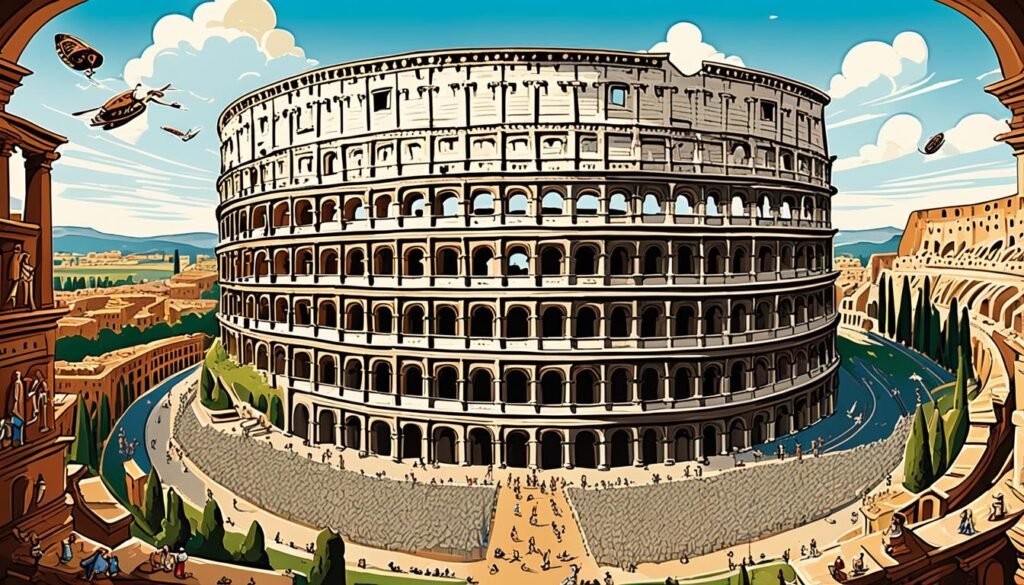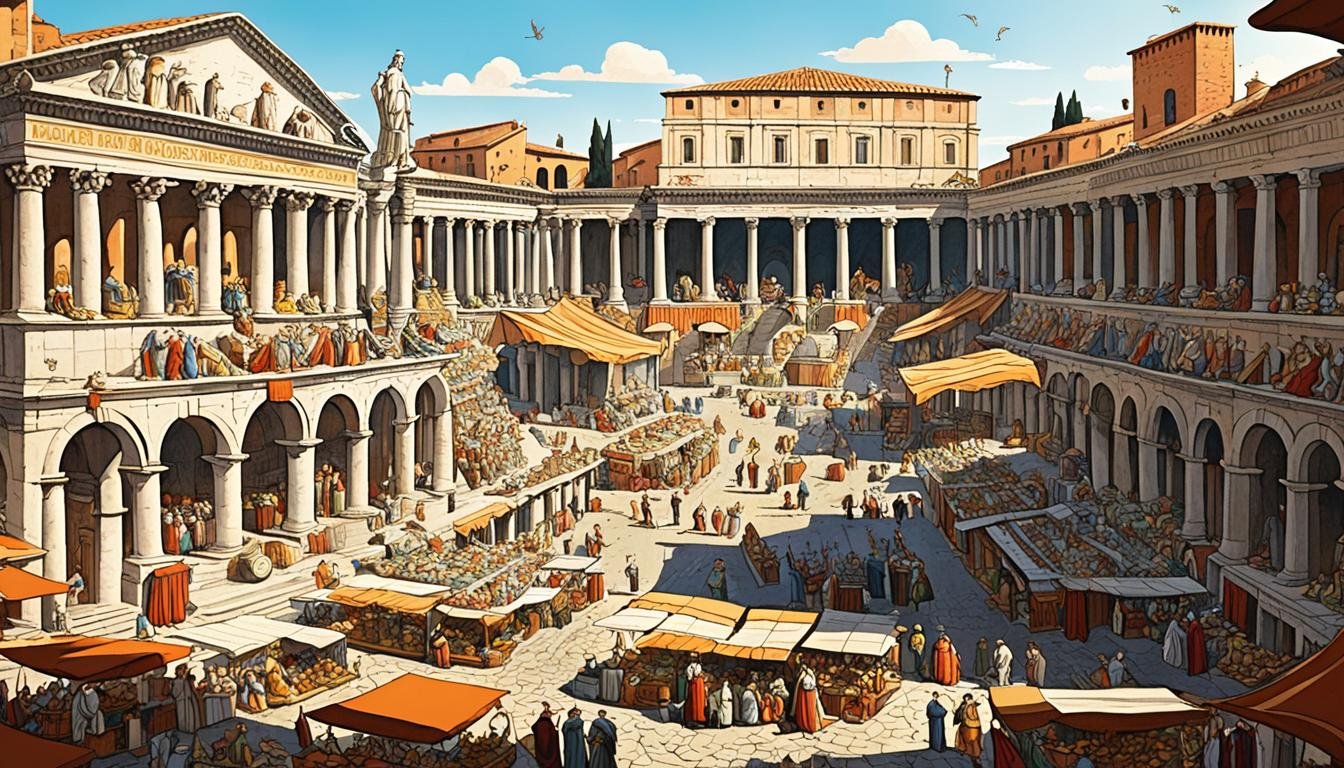In order to understand the historical context of Jesus’ birth, it is important to explore the significant events that took place before his arrival. These events shaped the world in the era of antiquity and set the stage for the coming of the Messiah.
Key Takeaways:
- Before Jesus was born, several significant events occurred that influenced the world in the era of antiquity.
- These events included the reign of King David, the rise and fall of empires, and the rule of Herod the Great.
- King David’s lineage was important as both Joseph and Mary, Jesus’ parents, descended from his family.
- Various empires, such as the Assyrian, Babylonian, Persian, Greek, and Roman Empires, rose to power and left their mark on history.
- The rule of Herod the Great, supported by the Roman Empire, had a significant impact on the region where Jesus would be born.
The Reign of King David
King David, a prominent figure in the Old Testament, ruled over Israel. His reign is mentioned in 1 Samuel 16. David’s lineage is important because it is from the family of King David that both Joseph and Mary, the parents of Jesus, descended.
In 1 Samuel 16, the prophet Samuel was sent by God to anoint the next king of Israel. He went to the house of Jesse in Bethlehem, where he met David, the youngest son of Jesse. Despite his humble background as a shepherd, David was chosen by God to become the future king of Israel.
“But the Lord said unto Samuel, Look not on his countenance, or on the height of his stature; because I have refused him: for the Lord seeth not as man seeth; for man looketh on the outward appearance, but the Lord looketh on the heart.” – 1 Samuel 16:7
David’s reign as king was marked by various significant events, including his defeat of the giant Goliath with a single stone and his establishment of Jerusalem as the capital of Israel. He was not only a skilled warrior, but also a talented musician and poet, as evidenced by the psalms he composed.
David’s reign was characterized by both triumph and tragedy. While he achieved great military success and expanded Israel’s territory, he also faced personal and spiritual struggles, such as his affair with Bathsheba and the consequences that followed.
Despite his shortcomings, David’s faithfulness to God and his desire to build a lasting dynasty were noteworthy. It is through his lineage that Jesus, the promised Messiah, would eventually be born.
The Rise and Fall of Empires
Before the birth of Jesus, various empires rose to power and eventually fell. These empires played a significant role in shaping the historical context of the time and had a profound impact on the world. Let’s take a closer look at five of the most influential empires that emerged during this period:
1. Assyrian Empire
The Assyrian Empire, known for its military strength and aggressive expansion, dominated the ancient Near East during the 9th and 7th centuries BCE. Led by powerful rulers such as Tiglath-Pileser III and Sennacherib, the Assyrians established a vast empire that stretched from modern-day Iraq to Egypt. However, their empire eventually succumbed to internal conflicts and external invasions.
2. Babylonian Empire
The Babylonian Empire, under the rule of King Nebuchadnezzar II, reached its peak during the 6th century BCE. It was renowned for its advanced astronomy, impressive architectural achievements, and the infamous Hanging Gardens of Babylon. The Babylonians conquered the Assyrians and other neighboring kingdoms, establishing their dominance in the region.
3. Persian Empire
The Persian Empire, led by Cyrus the Great, rose to power in the 6th century BCE. Known for its efficient administration and cultural tolerance, the empire encompassed vast territories from Egypt to India. The Persians, who respected local customs and traditions, allowed conquered nations to retain some autonomy. Their empire lasted for centuries and shaped the political landscape of the ancient world.
4. Greek Empire
The Greek Empire, spearheaded by Alexander the Great, emerged in the 4th century BCE. Alexander’s military campaigns resulted in the conquest of the Persian Empire and the spread of Greek culture across the region. The Hellenistic period that followed saw the blending of Greek, Persian, and Egyptian influences, leaving a lasting impact on art, philosophy, and architecture.
5. Roman Empire
The Roman Empire, at the time of Jesus’ birth, was a dominant force in the Mediterranean world. Originally a republic, it transitioned into an empire under the rule of Julius Caesar and subsequent emperors. The Romans’ military prowess, effective governance, and engineering marvels, such as aqueducts and roads, facilitated their vast territorial expansions. The empire reached its zenith in the 2nd century CE, but eventually faced decline and fragmentation.
These empires, each with their distinctive characteristics, played a critical role in shaping the historical backdrop in which Jesus was born. Their rise and fall set the stage for significant political, cultural, and religious developments that would follow.

Ptolemaic and Selucid Rule in Palestine
After Alexander the Great’s conquests, his generals divided the empire. General Ptolemy ruled over Palestine and Egypt, while General Selecus ruled over Syria, Babylon, and a large part of Asia Minor. This division of power resulted in two distinct regions of influence within Palestine.
During the Ptolemaic Rule, which lasted from 301 to 198 BC, Palestine was under the control of the Ptolemaic dynasty, founded by Ptolemy I Soter. The Ptolemies brought Greek influence to the region, including the introduction of Greek language, culture, and administrative systems.
In contrast, the Selucid Rule began in 198 BC when Antiochus III, a Selucid king, gained control over Palestine from the Ptolemies. The Selucids continued the Hellenization process in Palestine, but faced opposition from the Jewish population who resisted the imposition of Greek customs and religious practices.
“Jewish rule” refers to the period between 167 and 63 BC when the Jews revolted against the Selucids, achieving a limited degree of autonomy and religious freedom. The Maccabean revolt led to the establishment of the Hasmonean dynasty, a Jewish state in Palestine.
“The Ptolemaic and Selucid rules in Palestine marked significant periods of Greek influence and power in the region. These foreign rulers had a profound impact on the cultural, political, and religious landscape of Palestine.”
The Hasmonean Dynasty
Under the Hasmonean dynasty, which lasted from 140 to 37 BC, the Jews ruled over Palestine. This period saw the consolidation of Jewish rule and the expansion of their territory, which encompassed Judea, Samaria, and parts of modern-day Israel, Jordan, and Lebanon.
The Hasmonean rulers, also known as Maccabees, sought to preserve Jewish traditions and religion. However, internal conflicts, including power struggles and tensions between traditionalists and Hellenized Jews, weakened the dynasty.
Ultimately, the end of Jewish rule came with the Roman conquest of Palestine in 63 BC, when Pompey the Great intervened in a dispute between rival Hasmonean factions and made Palestine a Roman province. This marked the beginning of Roman rule over the region, setting the stage for the birth of Jesus and the subsequent events that unfolded during the New Testament era.
| Period | Ruling Dynasty | Key Events |
|---|---|---|
| Ptolemaic Rule | Ptolemaic Dynasty | Introduction of Greek influence, Greek language, and administrative systems |
| Selucid Rule | Selucid Dynasty | Continued Hellenization, Jewish resistance |
| Jewish Rule (Hasmonean Dynasty) | Hasmonean Dynasty | Consolidation of Jewish rule, expansion of Jewish territory |
| Roman Rule | Roman Empire | Conquest of Palestine, establishment of Roman province |
Herod the Great and Roman Rule
Herod the Great, a prominent figure in history, played a significant role in the region of Palestine during the time before Jesus was born. As a Jewish king, he ruled under the authority of the mighty Roman Empire, which held dominion over a vast expanse of territories.
With the support of Mark Anthony and later Octavian, who would become Augustus Caesar, Herod the Great gained control over Palestine. This alliance with powerful Roman leaders allowed him to secure his position as king and maintain stability in the region.
Herod’s reign was marked by his ambitious building projects, which showcased his desire to leave a lasting legacy. One of his notable achievements was the reconstruction of the Jewish Temple in 20 BC, a feat that earned him admiration among the Jewish population.
This reconstruction of the Jewish Temple was a significant undertaking, reflecting both Herod’s dedication to his faith and his desire to demonstrate loyalty to the Jewish community. It served as a central place of worship and ensured the continuation of religious practices for the Jewish people.
Herod the Great’s Building Projects
| Building Projects | Description |
|---|---|
| Reconstruction of the Jewish Temple | A grand project that involved expanding and beautifying the ancient Temple in Jerusalem |
| Fortresses | Constructed impressive fortresses, such as Herodium and Masada, for defense and security |
| Palaces | Built opulent palaces, including the Herodion and the Antonia Fortress, to showcase his wealth and power |
| Harbors | Developed ports in Caesarea Maritima and other coastal cities to promote trade and commerce |
| Public Works | Constructed aqueducts, roads, and public buildings to improve infrastructure throughout his kingdom |
Herod the Great’s building projects not only left architectural marvels but also stimulated economic growth, providing employment opportunities and attracting visitors from near and far. Despite his controversial rule and reputation for cruelty, Herod the Great’s contributions to the infrastructure of Palestine cannot be denied.
The Birth of Jesus and Herod’s Reign
Jesus was born during the reign of Herod the Great. Herod, who ruled over Palestine under the authority of the Roman Empire, perceived Jesus as a potential threat to his rule. In an attempt to eliminate this perceived threat, Herod sought to find and kill Jesus.
However, Jesus’ family managed to escape to Egypt until Herod’s death in 4 BC. This escape ensured Jesus’ safety and preserved his life. After Herod’s demise, his three sons took over the rule of Palestine, divided under Roman authority.
Divine Reassurances and the Incarnation
Before Jesus’ birth, several divine reassurances were given to different individuals. The angel Gabriel played a significant role in these reassurances, appearing to Zacharias, Mary, Joseph, and frightened shepherds to deliver messages about the incarnation and the birth of the Messiah.
Angel Gabriel’s Visitations
Do not be afraid, Zacharias, for your prayer is heard; and your wife Elizabeth will bear you a son, and you shall call his name John.
When Zacharias, a priest, was serving in the temple, the angel Gabriel appeared to him and conveyed the news of his wife’s pregnancy. This divine reassurance marked the beginning of the fulfillment of prophecies and the preparation for the arrival of the Messiah.
“Do not be afraid, Mary, for you have found favor with God. And behold, you will conceive in your womb and bring forth a Son, and shall call His name Jesus.
Mary, a young woman engaged to Joseph, received a divine visitation from the angel Gabriel. In this divine reassurance, Gabriel informed Mary of her role in the incarnation of the Son of God. Mary’s obedience and faith in this message would lead to the birth of Jesus, the Savior of the world.
“Joseph, son of David, do not be afraid to take to you Mary your wife, for that which is conceived in her is of the Holy Spirit. And she will bring forth a Son, and you shall call His name Jesus, for He will save His people from their sins.”
Joseph, Mary’s betrothed, also received a divine reassurance through the angel Gabriel. This reassurance confirmed the miraculous nature of Mary’s pregnancy and reaffirmed Joseph’s role as the earthly father of Jesus. Through this message, Joseph was encouraged to embrace his significant role in the incarnation of the Savior.
Do not be afraid, for behold, I bring you good tidings of great joy which will be to all people. For there is born to you this day in the city of David a Savior, who is Christ the Lord.”
Additionally, the shepherds tending their flocks in the fields received a divine visitation from a multitude of heavenly beings. The angelic announcement provided them with a message of divine reassurance and proclaimed the birth of the long-awaited Messiah. This invigorating news stirred them to seek out the newborn Savior in Bethlehem.
To summarize, divine reassurances were given to various individuals before the birth of Jesus. These reassurances, delivered by the angel Gabriel, affirmed the incarnation of the Son of God and played a crucial role in preparing the world for the arrival of the Messiah.

The Journey to Bethlehem
The journey to Bethlehem played a crucial role in the story of the incarnation, involving multiple individuals throughout history. From biblical figures to the wise men, each journey had its own significance.
Naomi and Ruth
One notable journey to Bethlehem is that of Naomi and Ruth. In the book of Ruth, Naomi and her daughter-in-law Ruth traveled from Moab to Bethlehem after facing hardships. This journey led Ruth to meet Boaz, an event that played a pivotal role in the lineage of Jesus.
Prophet Samuel
Another significant journey to Bethlehem was undertaken by the prophet Samuel. In 1 Samuel 16, Samuel traveled to Bethlehem to anoint David as the future king of Israel. This journey marked the beginning of David’s reign, which would later play a crucial role in the lineage leading to Jesus’ birth.
Mary and Joseph
One of the most famous journeys to Bethlehem is that of Mary and Joseph. As per the Gospel of Luke, they traveled from their hometown of Nazareth to Bethlehem for the Roman census. During this journey, Mary gave birth to Jesus in Bethlehem, fulfilling the prophecies of the Messiah’s birthplace.
“And Joseph also went up from Galilee, out of the city of Nazareth, into Judaea, unto the city of David, which is called Bethlehem; (because he was of the house and lineage of David).”
Luke 2:4
The Wise Men
Finally, the wise men embarked on a divine journey to Bethlehem following the appearance of a star, which they believed signified the birth of a king. They traveled from the East to pay homage to Jesus, presenting him with gifts of gold, frankincense, and myrrh.
In summary, the journey to Bethlehem brought together different individuals from various periods in history, all converging on the birthplace of Jesus. These journeys underscore the divine orchestration leading to the incarnation and the fulfillment of prophetic promises.
The Birth of Jesus
In Bethlehem, Mary gave birth to Jesus in a humble setting. Due to the lack of space in the inn, Jesus was laid in a manger, a feeding trough for animals. This event fulfilled prophecies and marked the beginning of the life of Jesus as the Savior.
An angel Gabriel, communicating with Mary, said: “Do not be afraid, Mary, for you have found favor with God. And behold, you will conceive in your womb and bear a son, and you shall call his name Jesus. He will be great and will be called the Son of the Most High.” (Luke 1:30-32)
Despite the humble circumstances and lack of room in the inn, the birth of Jesus in Bethlehem carries great significance. It symbolizes the fulfillment of ancient prophecies and highlights Jesus’ humble beginnings as the Messiah, who would bring hope and salvation to the world. The birth of Jesus in Bethlehem is a central event in Christian belief and is celebrated by believers worldwide during the Christmas season.

| Prophecy | Fulfillment in the Birth of Jesus |
|---|---|
| Prophet Micah foretold that the Messiah would be born in Bethlehem. | The birth of Jesus in Bethlehem fulfills the prophecy, establishing Him as the long-awaited Savior. |
| The lack of space in the inn led to Jesus being laid in a manger. | This humble beginning emphasizes Jesus’ identification with the lowly and reflects His mission to bring salvation to all, regardless of social status or wealth. |
| Jesus’ birth in Bethlehem marked the fulfillment of various prophecies that foretold the coming of a Redeemer. | The fulfillment of these prophecies affirmed Jesus’ divine purpose and provided evidence of His identity as the Messiah. |
Conclusion
In conclusion, the events that transpired before Jesus was born played a significant role in shaping the historical context of his arrival. The reign of King David established an important lineage from which Joseph and Mary descended. The rise and fall of various empires such as the Assyrians, Babylonians, Persians, Greeks, and Romans paved the way for the Roman Empire’s rule during Jesus’ birth. Additionally, the rule of Herod the Great and the divine reassurances conveyed by the angel Gabriel further contributed to the anticipation of the Messiah’s coming.
Together, these events created a profound backdrop for Jesus’ birth and set in motion a series of events that would shape the course of history. The divine reassurances served to prepare individuals for the incarnation, and the journey to Bethlehem led to the humble birth of Jesus in a manger due to the lack of space in the inn. All of these elements culminate in the birth of Jesus, marking the beginning of his life as the Savior.
Thus, it is clear that understanding what happened before Jesus was born is crucial in comprehending the significance of his arrival and the profound impact he would have on the world. The historical and spiritual context surrounding his birth provides a deeper understanding of the purpose and importance of his life and teachings.
FAQ
What significant events happened before Jesus was born?
Before Jesus was born, several significant events took place. These events include the reign of King David, the rise and fall of various empires, and the rule of Herod the Great.
Who was King David and why is he important?
King David was a prominent figure in the Old Testament who ruled over Israel. His lineage is important because both Joseph and Mary, the parents of Jesus, descended from the family of King David.
Which empires rose and fell before Jesus’ birth?
Before the birth of Jesus, several empires rose to power and eventually fell. These empires include the Assyrian Empire, Babylonian Empire, Persian Empire, Greek Empire under Alexander the Great, and finally, the Roman Empire, which was in power during Jesus’ birth.
What was the Ptolemaic and Seleucid Rule in Palestine?
After Alexander the Great’s conquests, his generals divided the empire. General Ptolemy ruled over Palestine and Egypt, while General Seleucus ruled over Syria, Babylon, and a large part of Asia Minor. Later, there was a period of Jewish (Maccabean) rule, during which the Jews revolted for independence.
Who was Herod the Great and what was his role?
Herod the Great became the king of Jews in Palestine under the authority of the Roman Empire. He was known for his ambitious building projects, including the reconstruction of the Jewish Temple. Herod’s rule was significant during Jesus’ birth.
What happened during the reign of Herod the Great?
Jesus was born during the reign of Herod the Great. Herod attempted to find and kill Jesus, viewing him as a potential threat to his rule. However, Jesus’ family escaped to Egypt until Herod’s death in 4 BC. After his death, his three sons divided up the rule of Palestine under Roman authority.
How were divine reassurances given before Jesus’ birth?
Before Jesus’ birth, several divine reassurances were given to different individuals. The angel Gabriel played a significant role in these reassurances, appearing to Zacharias, Mary, Joseph, and frightened shepherds to deliver messages about the incarnation and the birth of the Messiah.
Who made the journey to Bethlehem?
The journey to Bethlehem was a significant part of the incarnation story, involving multiple individuals at different points in history. The journeys to Bethlehem included Naomi and Ruth, the prophet Samuel, Mary and Joseph, and the wise men.
Where was Jesus born and what was the significance?
Jesus was born in Bethlehem in a humble setting. Due to the lack of space in the inn, he was laid in a manger, a feeding trough for animals. This event fulfilled prophecies and marked the beginning of Jesus’ life as the Savior.
What happened before Jesus was born?
Before Jesus was born, many significant events occurred, including the reign of King David, the rise and fall of empires, the rule of Herod the Great, and the divine reassurances given leading up to the incarnation. All of these events set the stage for the birth of Jesus and the impact he would have on the world.
Source Links
- https://www.easyenglish.bible/bible/easy/luke/1:26-38/
- https://www.jesuscentral.com/ji/historical-jesus/jesus-before.php
- https://digitalcommons.liberty.edu/cgi/viewcontent.cgi?article=1001&context=timeline_to_jesus

I’m Benjamin, a passionate spiritual seeker and creator of Verses and Prayers. Alongside my girlfriend Emma and our pet lizard Mulle, I cherish family life, enjoy exploring new places, and am deeply involved in my church community. My love for reading and singing biblical verses inspires every aspect of my journey.

